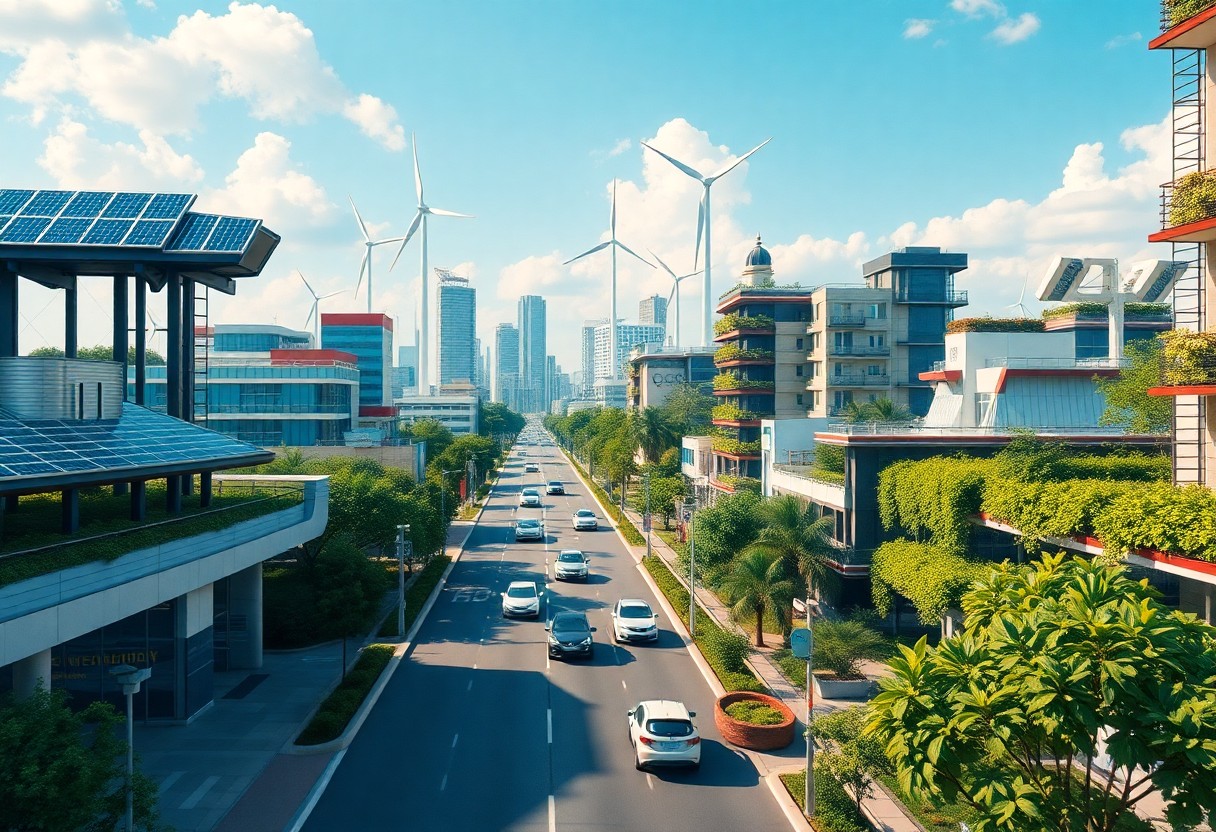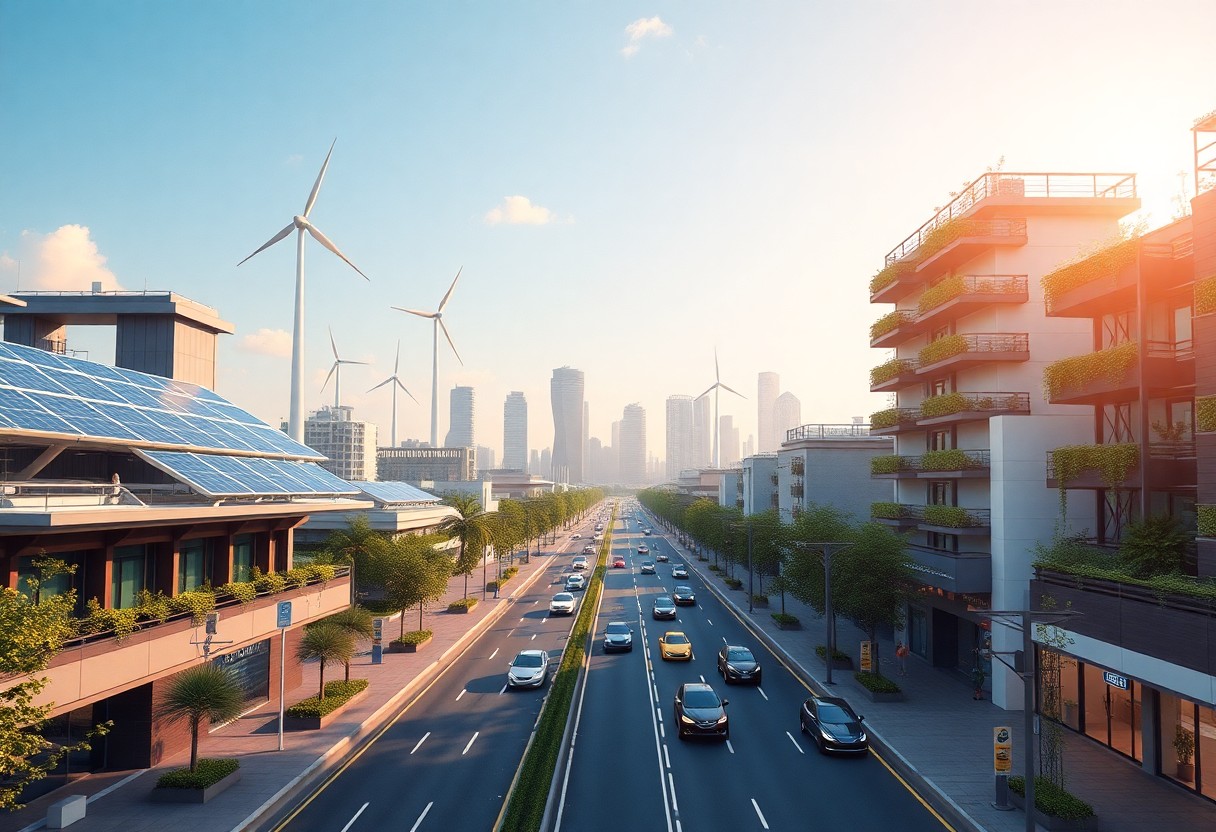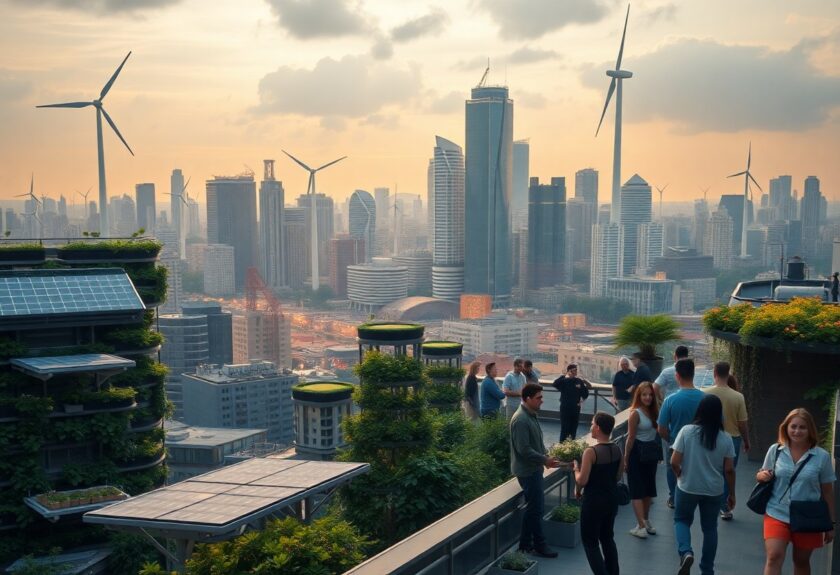Innovations in sustainable technology are reshaping our understanding of ecological responsibility and the power of human ingenuity. As you explore these groundbreaking advancements, you’ll find solutions that not only mitigate environmental impact but also enhance your quality of life. From renewable energy systems to biodegradable materials, these discoveries represent a positive shift in how you can engage with the planet. Embracing these technologies is vital, as your choices today will help create a sustainable future for generations to come.

The Rise of Renewable Energy Technologies
The rise of renewable energy technologies marks a significant shift towards a sustainable future. With increasing global awareness of climate change and environmental issues, innovative solutions in renewable energy have become crucial. You can expect a greater focus on integrating these technologies into everyday life, enhancing energy efficiency, and reducing reliance on fossil fuels. As governments and industries invest heavily in this evolution, the landscape of energy production will continue to transform in remarkably positive ways.
Solar Power Advancements
Advancements in solar power technology have revolutionised the way you harness sunlight for energy. The emergence of more efficient photovoltaic cells, along with improved energy storage solutions, allows for maximised power generation and usability. You can now take advantage of solar panels that are more affordable, compact, and produce higher output, making solar energy a viable option for both residential and commercial applications.
Wind Energy Innovations
Power generated from wind energy has seen exciting innovations in recent years. With the development of taller turbines and more effective materials, you can witness a significant increase in energy output. Offshore wind farms are expanding rapidly, enabling you to tap into stronger and more consistent wind currents. These advancements are not only making wind energy more efficient but also driving down costs, making it increasingly accessible.
Renewable energy sources like wind power are transforming the energy landscape, offering immense benefits to both the environment and your energy bills. You’ll find that new turbine designs are not only enhancing efficiency but also reducing disruptions to local wildlife. Additionally, offshore wind farms can harness some of the strongest winds, ultimately leading to higher energy outputs. As these innovations continue to develop, the potential for wind energy to become a dominant player in the renewable sector greatly enhances your opportunities for sustainable energy use.
Smart Grids and Energy Efficiency
Assuming you are concerned about energy consumption and sustainability, smart grids emerge as a revolutionary solution, optimising your energy use while reducing waste. By integrating advanced technologies, these grids enable real-time data and communication between utilities and consumers, allowing you to manage energy consumption more effectively. This not only drives energy efficiency but also contributes to a greener future by seamlessly integrating renewable energy sources into the grid.
Intelligent Energy Management Systems
Intelligent energy management systems help you take control of your energy consumption. By harnessing data analytics and monitoring tools, these systems allow you to optimise energy usage, reduce costs, and lower your carbon footprint. With real-time insights, you can make informed decisions that enhance overall energy efficiency, promoting sustainable practices in your daily life.
The Role of IoT in Sustainability
To embrace sustainability, you must consider the transformative impact of the Internet of Things (IoT). IoT devices collect data that helps manage energy consumption intelligently, making your home or business more efficient. From smart thermostats to energy-efficient appliances, these interconnected devices enable real-time monitoring and control, aligning your energy use with sustainable practices.
Grids developed with IoT technology offer a network of connected devices that actively monitor and adjust energy consumption in real time. By leveraging this data, you can significantly reduce your energy bill while contributing to a larger effort against climate change. The integration of smart meters and automated controls fosters a proactive approach to energy usage, allowing for the extensive adoption of renewable energy sources. This interconnected approach not only enhances the efficiency of your energy consumption but also supports the greater shift towards a sustainable future.
Sustainable Materials and Circular Economy
One of the most vital aspects of achieving a sustainable future involves embracing a circular economy that prioritises the use of sustainable materials. This approach not only reduces waste but also redefines how products are designed, utilised, and recycled. You can explore Five Game-Changing Technologies Nearing Their Tipping Point to see how innovations in material science are fuelling this transformation.
Biodegradable and Recyclable Materials
Sustainable materials, such as biodegradable plastics and recyclable composites, are gaining traction as you look for environmentally responsible choices. These innovations not only minimise the impact on landfills but also promote an economy where materials are kept in use longer, ultimately leading to greater resource conservation.
Innovations in Waste Reduction
To further advance sustainability, innovations in waste reduction are becoming increasingly important. Companies are investing in technologies that optimise production processes, leading to less waste generation while ensuring efficiency and sustainability.
In fact, by implementing advanced manufacturing techniques and using smart technologies, firms can significantly decrease waste output. Techniques such as 3D printing not only allow for the precise use of materials but also enable you to create products on demand, drastically cutting excess. Moreover, adopting closed-loop systems allows you to reintroduce materials back into production, ensuring that valuable resources are not lost in the process. Ultimately, these innovations empower you to contribute to a more sustainable, waste-free future.
Water Conservation Technologies
Despite increasing water scarcity, innovative water conservation technologies are emerging to help you manage resources more efficiently. These advances focus on minimising waste and ensuring that every drop counts, enabling you to achieve a sustainable future. From intelligent monitoring systems to advanced filtration techniques, these innovations hold the potential to transform how you interact with water, ensuring its availability for generations to come.
Advanced Filtration and Desalination
With the rising demand for clean water, advanced filtration and desalination technologies have become vital to your sustainable efforts. These methods can transform saline or polluted water into potable sources, thus broadening your available water supply. Below is a breakdown of two key technologies:
Technology Overview
| Advanced Filtration | Utilises materials that effectively remove contaminants and impurities from water. |
| Desalination | Process of removing salt and minerals from seawater, making it suitable for drinking and agriculture. |
Smart Irrigation Systems
Water efficiency in agriculture can be enhanced through smart irrigation systems, which cater to your plants’ specific needs. These systems utilise advanced technology to monitor soil moisture, weather patterns, and crop requirements, allowing for accurate watering schedules that conserve water while maximising growth.
Systems like drip irrigation and automated timers not only save water but also reduce the risk of overwatering, which can harm your plants and lead to nutrient leaching. By implementing smart irrigation, you will experience notable benefits, such as improved crop yields, decreased water waste, and lower utility bills. Investing in these technologies is vital for reducing your environmental impact and ensuring a more sustainable approach to agriculture.

Electric and Sustainable Transportation
Your journey towards sustainable living starts with electric and sustainable transportation. As urban environments continue to evolve, embracing eco-friendly travel options becomes imperative. Future innovations in this sector promise to redefine how you commute, reducing emissions and minimising your carbon footprint. Discover how exciting advancements are shaping safer, more effective alternatives for everyday travel and contributing to a greener planet.
E-Mobility Solutions
On your quest for greener travel, e-mobility solutions have emerged as a transformative force. Electric vehicles (EVs) offer not just an alternative to petrol-driven transport, but they also provide enhanced efficiency and reduced operational costs. As infrastructure improves and charging stations become more widespread, these solutions will empower you to make more informed choices that positively impact the environment.
The Future of Public Transportation
One of the most promising aspects of sustainable transport lies in the evolution of public transportation systems. With advancements such as electric buses and innovative tram networks, the future is bright for commuters. As you ride these cleaner, energy-efficient vehicles, you’ll not only help reduce urban congestion but also contribute to lowering air pollution.
Solutions like autonomous electric buses and integrated travel apps are set to revolutionise the way you navigate urban landscapes. Envision a seamless interface that connects you with real-time updates, optimising your journey while limiting carbon emissions. Public transport will increasingly focus on sustainability, ensuring that you have access to affordable, efficient options. Embracing these innovations will significantly enhance your commutes and promote a healthier environment for future generations.

Policy and Investment in Sustainable Tech
Unlike traditional sectors, sustainable technology thrives on robust policy frameworks and significant investments. You should understand that proactive governance can stimulate growth in this field, driving innovation and facilitating access to important funding for groundbreaking projects. The interplay between governmental policies and investment strategies is vital in shaping a sustainable future, ensuring that the benefits of technology are felt across all segments of society.
Government Initiatives
Before submerging into the market, you must recognise that government initiatives play a pivotal role in the advancement of sustainable technology. Through favourable regulations, grants, and subsidies, governments are actively fostering an environment that encourages research and development in sustainable practices, effectively paving the way for a greener future.
Private Sector Contributions
Across various industries, the private sector is stepping up to the plate, contributing significantly to sustainable technology efforts. You will find that many companies are now prioritising eco-friendly practices and investing in innovative solutions that reduce environmental impact, reflecting a growing awareness of their social responsibilities.
To further illustrate, private sector contributions encompass a wide range of initiatives, from investment in renewable energy projects to the development of sustainable supply chains. Companies are increasingly adopting circular economy models, ensuring resources are reused and recycled effectively. You should also note that partnerships between businesses and sustainability-focused start-ups are fostering innovation and driving progress. This collective effort not only optimises resource management but also creates economic opportunities while addressing pressing environmental challenges, showcasing the private sector’s integral role in reshaping the future of sustainable technology.
Conclusion
As a reminder, the landscape of sustainable technology is evolving rapidly, driven by game-changing innovations that can significantly impact your life and the environment. By embracing these advancements, you have the power to contribute to a more sustainable future, enhancing efficiency and reducing your carbon footprint. Staying informed about these developments will enable you to make wise choices, ensuring that your actions align with your values and contribute to a healthier planet for generations to come.
FAQ
Q: What are some examples of game-changing innovations in sustainable technology?
A: Game-changing innovations in sustainable technology encompass a wide range of advancements. One prominent example is solar energy technology, which has seen dramatic improvements in efficiency and storage capabilities, enabling wider adoption and reduced reliance on fossil fuels. Another notable innovation is biodegradable materials, which have emerged as alternatives to traditional plastics, helping to reduce environmental pollution. Furthermore, advancements in carbon capture technology are allowing industries to reduce greenhouse gas emissions significantly, making it a vital component in the fight against climate change.
Q: How do sustainable technologies impact the economy?
A: Sustainable technologies can have a profound impact on the economy by creating new job opportunities in green sectors, promoting innovation, and reducing operational costs for businesses. By investing in renewable energy sources and sustainable materials, companies can lower their energy expenditures and improve their competitive edge. Additionally, the shift towards a more sustainable economy can stimulate growth in sectors such as clean energy, electric vehicles, and waste management, thus driving economic advancement while addressing environmental challenges.
Q: What role do consumers play in the advancement of sustainable technologies?
A: Consumers play a pivotal role in the advancement of sustainable technologies by driving demand for eco-friendly products and services. By choosing sustainable options, individuals can encourage companies to adopt greener practices and invest in innovations that minimise environmental impact. Consumer awareness and activism can also influence government policies and regulations, pushing for greater support and funding for sustainable technology initiatives. As public interest in sustainability grows, the collective choices of consumers can greatly accelerate the transition towards a more sustainable future.



